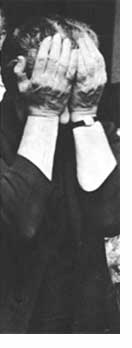
Golda's Balcony: Historical Background
Israel's Nuclear Option
 The Israelis would fight with conventional weapons for as long as they could, and if the tide were turning decisively against them, and if help in the form of resupply from the United States or any other guarantors were not forthcoming, it is safe to predict that they would fight with nuclear weapons in the end. It used to be said that the Israelis had a Masada complex, but if the Israelis are to be understood in terms of a “complex” involving suicide rather than surrender and rooted in a relevant precedent of Jewish history, the example of Samson, whose suicide brought about the destruction of his enemies, would be more appropriate than Masada, where in committing suicide the Zealots killed only themselves and took no Romans with them.
The Israelis would fight with conventional weapons for as long as they could, and if the tide were turning decisively against them, and if help in the form of resupply from the United States or any other guarantors were not forthcoming, it is safe to predict that they would fight with nuclear weapons in the end. It used to be said that the Israelis had a Masada complex, but if the Israelis are to be understood in terms of a “complex” involving suicide rather than surrender and rooted in a relevant precedent of Jewish history, the example of Samson, whose suicide brought about the destruction of his enemies, would be more appropriate than Masada, where in committing suicide the Zealots killed only themselves and took no Romans with them.Norman Podhoretz
Commentary, July 1976
For years there has been widespread speculation about Israel’s nuclear potential—speculation that has now been confirmed. At a briefing for a group of American space experts in Washington recently, an official of the Central Intelligence Agency estimated that Israel had between ten and twenty nuclear weapons “available for use.” In fact, Time has learned, Israel possesses a nuclear arsenal of thirteen atomic bombs, assembled, stored and ready to be dropped on enemy forces from specially equipped Kfir and Phantom fighters or Jericho missiles. These weapons have a 20-kiloton yield, roughly as powerful as those that obliterated Hiroshima and Nagasaki.
The Dimona nuclear reactor went into operation in 1964. Meanwhile, an intense secret debate had begun within Israel about whether the government should also build a separation plant to produce the fissionable material necessary for an A-bomb. Ben-Gurion and Shimon Peres, then Deputy Prime Minister, favored doing so. Others, including Golda Meir and Yigal Allon, initially opposed the project.
Israel’s thirteen bombs, Time has also learned, were hastily assembled at a secret underground tunnel during a 78-hr. period at the start of the 1973 War.
Time Magazine
April 12, 1976